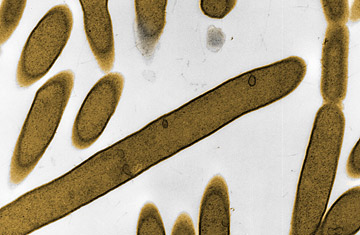
Clostridium is a genus of Gram-positive bacteria, belonging to the Firmicutes
When it comes to bugs like bacteria and parasites, we've been trained to think that less is better. But there are some good guys in the microbial world — bugs that do the unglamorous work of keeping us regular and helping to relieve a range of disorders from diarrhea to irritable bowel syndrome (IBS). Now a new study suggests that the same microbes may even help us stay slim.
In the Proceedings of the National Academy of Sciences, researchers at Arizona State University's Biodesign Institute, the University of Arizona and the Mayo Clinic in Arizona report a very small study of nine individuals — three of normal weight, three who were morbidly obese and three who underwent gastric-bypass surgery. The team found that each group harbored a different intestinal zoo of microbes and that following their surgery, the gastric-bypass patients' gut bugs ended up looking much more similar to those of the normal-weight patients. (See the Year in Health, from A to Z.)
While these results are only preliminary, they do point to an entirely new way that doctors and patients might be able to tackle the growing obesity epidemic in the U.S. "This study suggests that the differences in the organisms may play at least some role in why people lose the weight they do," says Dr. John DiBaise, a gastroenterologist at the Mayo Clinic and one of the study's authors. "Ultimately, we may not only be able to manipulate the microbes of obese individuals to look like those of normal-weight people, but we might also potentially be able to predict a person's susceptibility to obesity."
What might be happening, suspects DiBaise, is that each person's ability to extract energy and store fat from food changes depending on which combination of bugs are living in the gut. Those who are morbidly obese, it seems, tend to nurture bugs that promote the fat-storage process, which might be a factor in their excessive weight gain. The bypass patients appeared to follow a similar pattern but in the opposite direction, eating less first and then developing bugs appropriate to that diet. It's not clear how the physical act of reducing food intake drives that change, nor how long-lasting the possible slimming effects of the new bug population will be. (See pictures of what makes you eat more food.)
But none of this means that downing the latest probiotic yogurts, which contain certain strains of good gut bacteria, should be the next weight-loss craze. For one thing, says DiBaise, the strains that were dominant in the normal-weight people are not the same as those promoted in the popular probiotic yogurts. Second, there is no evidence that probiotic products can do anything about weight loss; the latest scientific studies have shown only that probiotics can relieve antibiotic-related diarrhea, as well as alleviate IBS and aide regularity. "It is interesting to look at microbial flora," says Lynne McFarland, an epidemiologist at the Puget Sound Veterans Administration Medical Center, who was not affiliated with the study. "But I would not run out and eat a lot of yogurt because of this."
At least, not yet. More studies are needed to follow the same people as they lose weight through diet and exercise, to see if the composition of their gut flora changes — as it did with the gastric-bypass patients. What's more, notwithstanding the seeming cause-and-effect link between gut flora and weight, that relationship can be deceiving; a third factor entirely may be causing both — a diet of highly processed foods, for instance, suggests Dr. David Katz, director of the Yale Prevention Research Center. What's more, says Katz, "regardless of the variation of gut flora in the population, the entire population is getting heavy. So probiotics might tweak one's personal vulnerability to obesity, but they would not much move the big dial [on the obesity epidemic]." Still, as anyone fighting the numbers on the scale knows, every little bit helps — even something a little as a bacterium.
